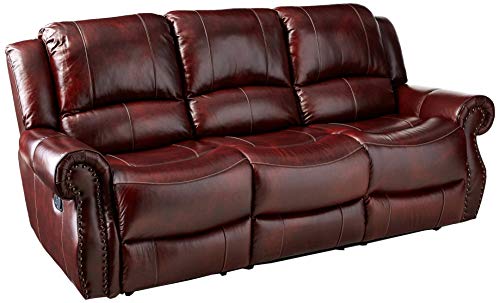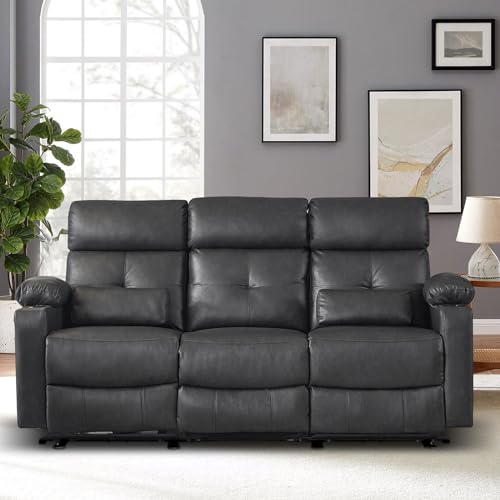Undisputed Proof You Need Genuine Leather Sofa
페이지 정보

본문
 How to Spot a Genuine Leather Sofa
How to Spot a Genuine Leather SofaWith a buttery-soft leather upholstery this sofa looks fantastic in any space. Customers love its simple style and premium genuine leather upholstery.
Untrained eyes might have trouble identifying the difference between real and faux leather. Here are six helpful tips to help you recognize the difference: 1. Edges that are rough.
1. Take a look at the label
Real leather has a distinct appearance and feel that's difficult to replicate. It's also durable, easy to clean and does not absorb body oils, which makes it a great choice for families with allergies. However there are many different leather sofas that are created equally. Some retailers are even recognized for presenting PVC as genuine Leather.
Understanding the different types of leather will help you to avoid being scammed. This includes determining the difference between full grain and top grain leather, as well as evaluating the quality of the upholstery material. Do not be afraid to ask your favorite retailers for this information.
The first step in identifying the genuine leather sofa is to look at the label. The label should clearly state the type of leather used to cover the sofa along with any other materials such a fabric or cotton. In addition, reputable sellers will have clear policies regarding exchange or return in the event that you're dissatisfied with your purchase.
If the sofa doesn't have a label you can still verify its authenticity by looking at the upholstery's fabric backing or opening the cushion casing. You can also examine the texture of the leather to determine if it has any imperfections or bumps, since these are indicators that you're dealing in fake or bonded leather.
Another way to check the authenticity of a sofa is by touching its surface using your fingertips. Genuine leather has a soft, smooth texture. The faux leather, also known as bonded, is coarser and feels more like suede. You should also be able to feel the difference between bumps, wrinkles, and printed patterns of faux leather and genuine leather.
While a genuine leather sofa will cost more than a faux counterpart, it's an investment that will last longer and often end up as family heirlooms through the years. Place your leather sofa in a bright cool and cool room, far from fireplaces, heaters and air cooling units. This will reduce the damage caused by humidity, heat, and the ozone. You can also use leather protection creams to keep your sofa supple and strong.
2. Check out the back
If the label does not identify the type of leather is present in the sofa, it is crucial to look it up close. The scent, the feel and the back are all clear indicators.
Genuine leather won't feel smooth when you feel it. This is due to the fact that animal hides have different shaped pores which allow them to breathe. However, a leather product that is smooth and soft suggests that it may be fake leather.
Check for bumps or uneven surfaces. The process of preparing genuine leather lounge includes buffing, which takes away some of the rough outer skin. If the material covering your sofa is top grain leather, there should still be some bumps.
You can also test the leather by running your fingers over it and pressing into it. If the leather is real it will stretch and wrinkle just like human skin. This means it's capable of breathing, which means that the leather doesn't get dry and crack with time.
Faux leather is uniform in pattern because it is printed, whereas genuine leather sofas for sale is prone to imperfections that add to the beauty and durability of the leather. This includes scratches and creases. A genuine leather sofa is soft and a bit stiff when new, however it should not crack or dry out over time if regularly maintained with a specific leather protection cream.
Certain furniture manufacturers mix real leather with synthetic leather in order to save money. The contact areas, such as the arm rests, chairs and backs, are constructed from genuine leather, while non-contact components, like the base and the outside arms are upholstered in a less expensive polyurethane or leather couches clearance-like synthetic fabric. Even if the sofa is advertised as genuine leather, it is best to examine the back to determine if it's genuine leather.
Labels and prices can point you in the right direction, but to truly be sure a sofa is genuine leather it's essential to get up close and close to it. Take a whiff, rub it, and then check its back for a backing made of polyurethane which is an obvious indication that it's not genuine leather.
3. Take a look at the seat
The seat of a genuine leather sofa is an additional indicator of its quality. While many faux leather couches use various fabrics for the upholstery Genuine leather has a distinctive texture that is soft to the touch, but isn't totally uniform in color or shade. Look for bumps beneath the surface, and a distinct natural scent. These characteristics distinguish real leather from low-grade or artificial imitations.
If the leather is stitched in a continuous, large piece, that's another obvious sign. Although this isn't uncommon when using faux leather, if you notice this with genuine top-grain leather, it's likely a sign that the sofa isn't of high-quality and should be avoided.
Pricing and labels can give you an idea however the only way to know for sure is to get up close to the furniture. The genuine leather isn't perfect, and it will feel rough to the touch. It also has fat wrinkles under the surface and rough edges. Genuine leather is soft and different than synthetic materials. The temperature of the furniture can be a sign of whether it is made from authentic materials.
Leather sofas are a mainstay of interior design for good reason. They're elegant, durable, and long-lasting. It is also easy to clean and resistant to liquid spills. This makes it an ideal choice for families who have pets or children. The best part about genuine leather, however it's that it's a timeless style that will never be trendy, and it's still available in a variety of prices.
Take a look at Pottery Barn's Turner leather sofa that will last for years. This two-seater may be on the pricey side however it's made of top-quality leather that can last for a lifetime. It's a great option for those with small spaces, too, since it's available in three sizes and is small enough to fit into the majority of rooms.
This All Modern Geo Genuine Leather sofa is a great option for those who want something a bit more modern. The couch is a mid-century modern-inspired design with an angular, sleek frame and asymmetrical pillows that blend form and function. This sofa is made of plywood as well as composite and plastic. The leather is only used in the seating area. It is an upgrade from Ikea's faux-leather sofa, which won CHOICE's "Shonky Award" in 2015.
4. Check out the smell
Real leather has an unmistakable smell. It's an organic, natural scent that cannot be duplicated. If the sofa that you're trying to purchase has a strong artificial smell it's not authentic. It is usually due to the chemicals used to make the leather, which remain in the furniture after it has been made and even once you have it at home.
You can check the quality of the leather by gently running your fingers along the surface. Genuine leather will feel rough and include bumps and lumps, just like human skin. If it feels smooth and cold, it's most likely fake or the leather is bonded.
You can also take one of the cushions and examine the back. The Faux Leather couch and bonded leathers will have a polyurethane backing to help support the upholstery that is manufactured, whereas genuine leather has a natural back that resembles in appearance to coarse suede. If the couch has a woven backing that is not genuine leather.
Peter says that the best method to determine whether a sofa is genuine is to gently run your fingernails over the surface. The scratches on the leather will make your fingernails duller and the surface will be stretched and wrinkled slightly. It will also feel warm and supple to the touch.
Reversing the sofa to its back and inspecting the upholstery will also let you know if the sofa is genuine. Genuine leather is a continuous piece of leather, not a plastic coated faux or bond leather.
Consider how much you will use your leather sofa and how long it will last before deciding on the best. The more you use your couch and the more you use it, the more it will require to be maintained. Peter suggests regular and gentle cleaning with an exclusive leather conditioner to help maintain the suppleness and softness of the leather and prevent it from becoming dry and hard.

- 이전글Discovering the Fastest Payouts Betting Sites for Optimal Betting Success 25.01.09
- 다음글3 Reasons You're Not Getting Truck Accidents Lawyer Isn't Performing (And How To Fix It) 25.01.09
댓글목록
등록된 댓글이 없습니다.

